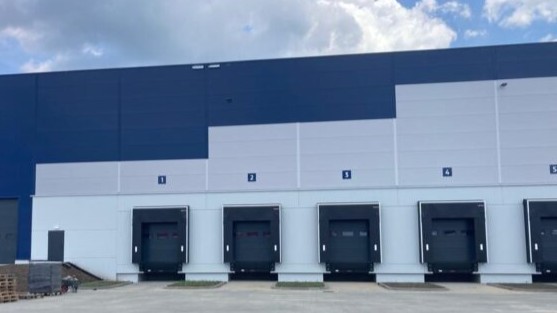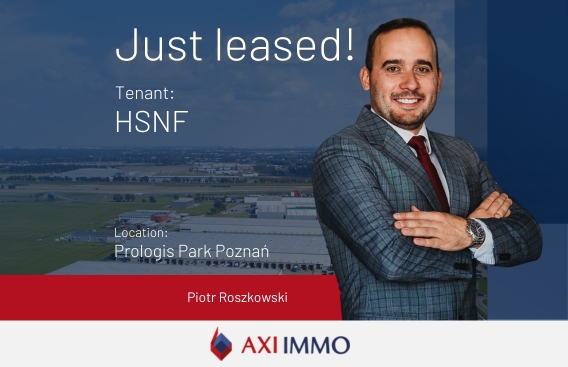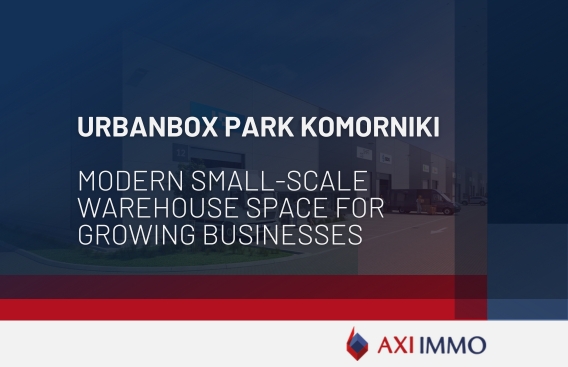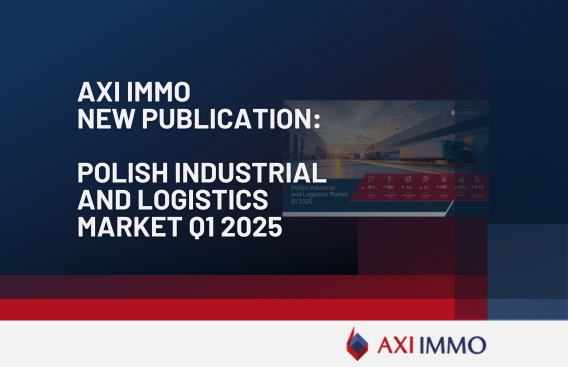Raport: AXI IMMO presents: Report – Polish Warehouse Market in Q1 2020
AXI IMMO Report - Polish Warehouse Market in Q1 2020. Rents, demand, supply, vacancy rates and forecasts for the warehouse market.
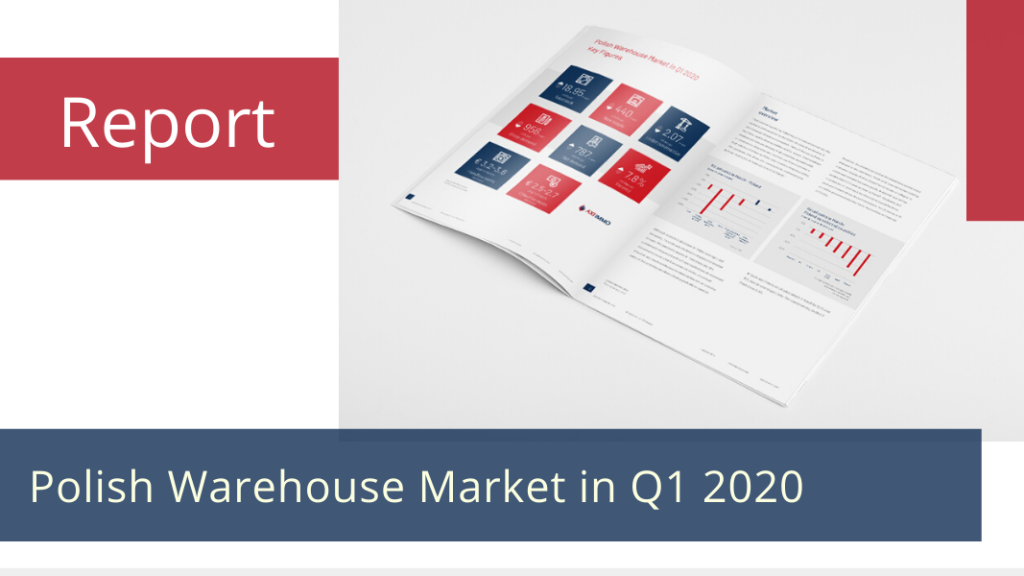
The Latest Report – Polish Warehouse Market in the first quarter of 2020 developed by AXI IMMO experts.
| REPORT – Polish Warehouse Market in Q1 2020″ Download PDF | 362 KB |
Poland’s total industrial stock reached over 18.95 million sq m at the end of Q1 2020 (+15% y/y). Occupier demand remained robust in Q1, easing by just 5% y/y despite Covid-19 lockdown measures. This has kept rental rates stable in most markets. On the investment side, the opening quarter of 2020 was one of the best on record, with transaction volumes almost matching the annual total for 2019.
– The first months on the investment market were very optimistic, especially in the industrial sector. We observed increased interest in portfolio transactions in the sector. The Covid-19 pandemic caused a slowdown in the market, however. Property valuations at the end of the first quarter were generally unchanged due to the lack of transactional evidence, although increased market risk was acknowledged. We expect nervousness in the market, combined with lower availability of financing and issues with asset inspections to result in declines in capital values in the short term, albeit mainly for non-prime product – comments Renata Osiecka, Managing Director, AXI IMMO.
The investment market sees a return of large portfolio transactions
Logistics transactions dominated investment activity in the first quarter of 2020. In total, assets worth EUR 1.46 bn changed hands – almost the same amount as in the entire 2019 when the total volume equaled EUR 1.48 bn. The largest transaction was the takeover of all of Goodman’s CEE assets by GLP Group (of which approx. 880,000 sq m or 66% of the portfolio was comprised by Polish assets). In addition, Savills IM purchased a portfolio of 5 Panattoni parks (approx. 250,000 sq m) while P3 acquired the Maximus portfolio from Apollo Global Management including 6 parks in Poland (approx. 150,000 sq m).
High demand in spite of a pandemic
In the first quarter of 2020, the demand for modern warehouse space in Poland remained at a high level. Gross demand amounted to over 950,000 sq m (-5% y/y) and net demand (new leases and expansions) reached 787,000 sq m (16.7% y/y) and accounted for 82% of the total volume of lease transactions. The most active sectors were logistics (33%), commerce (19.5%), electronics (13%), FMCG (6%) and e-commerce (5.5%). Warsaw (292,000 sq m), Upper Silesia and Lower Silesia attracted the most attention of tenants. In terms of leased space in relation to the size of the market, Tri-City was the leader with 7.4%, ahead of Warsaw (7%), and Eastern Poland (5%).
– Despite the lockdown triggered by the COVID-19 pandemic, leasing transactions that were at an advanced stage have largely been finalized and ongoing negotiations are continuing. We are currently observing fewer new inquiries, with most relating to short-term leases. However, opening up the economy should gradually lift occupier activity – says Anna Głowacz, Head of the Industrial and Logistics Agency, AXI IMMO.
High development activity, maintained
In the first quarter of 2020, developers completed 440,000 sq m (-27.2% y/y) of industrial space. The largest projects were BTS P3 PepsiCo (58,500 sq m) in the Warsaw suburbs, Hillwood Wroclaw East II (52,400 sq m) in the Wrocław region and two Panattoni projects – 36,600 sq m in Bydgoszcz and 36,500 sq m in Upper Silesia. These new completions took Poland’s total industrial stock closer to 19 million sq m. The largest amount of space was delivered in Lower Silesia (over 160,000 sq m), followed by the Warsaw region (115,000 sq m) and Upper Silesia (66,000 sq m). Current pipeline of projects under construction amounts to approx. 2.07 million sq m (+ 2.6% y/y), of which 45.2% is speculative space. Interestingly, the Tri-City is the market leader in terms of space under construction in relation to market size – the city’s pipeline of 268,000 sq m equals 42% of its current stock.
Vacancy on an upward trend
A high share of speculative development resulted in an increase in the vacancy rate by 2.4 bps compared to Q1 2019 – to 7.8%. The largest amount of space is available in Central Poland – over 370,000 sq m which represents 11.8% of the total stock on this market. In percentage terms, the highest availability is in Kielce (35.6%), and the lowest in Western Poland and Eastern Poland.
Rental rates remain stable
Rents were stable throughout the first quarter in the majority of locations. The average base rates range between EUR 3.2 – 3.6/sq m. Traditionally, Warsaw is an exception on the list, with rents reaching EUR 4.8 / sq m.
– After considering rental holidays and incentives from developers, effective rates are 15% to 25% lower, and the final level depends on the number and quality of competing schemes in a given location. On average, urban projects are 10% more expensive than big boxes facilities Last-mile projects are on average 10% more expensive than big box investments – explains Anna Głowacz.
Outlook
The COVID-19 pandemic is posing multiple challenges for the industrial sector and the entire economy in the coming months. However, economic projections are relatively positive for Poland. According to the European Commission’s forecasts, Polish GDP should decline by 4.3% in 2020. It is the smallest projected decline of all EU countries and is well below the 7.4% fall expected for the EU as a whole.
On the demand side, short-term contracts and extensions will dominate the market in the next quarter. On the supply side, we can expect fewer new investments due to stricter financing conditions. On the other hand, companies will be under pressure to modify their supply chains to the new reality, notably to develop e-commerce channels in response to the rapid growth of online sales, which is likely to drive demand for last-mile logistics assets.
One of the expected consequences of the pandemic is deglobalization of supply chains. Companies are likely to strive to improve their security in this area. Poland – already an important “near-shoring” location in Europe and well-integrated with European supply chains and transport networks – could be one of the main beneficiaries of this trend.
About AXI IMMO
The AXI IMMO consulting company offers services in the commercial real estate sectors: warehouses and production halls, office space, investment plots, as well as investment consulting, property and facility management. The company implements projects in the field of commercial real estate in Poland and abroad. AXI IMMO provides market research as well as provides regular reports on the commercial real estate market. AXI IMMO’s biggest advantage is the combination of international service standards with reliable knowledge of the local market. As part of the international partnership, AXI IMMO belongs to the Gerald EVE International and IRELS associations. Employees are members of the SIOR and RICS associations.
Recent articles
23 June 2025
Panattoni Park Warsaw West Błonie near Warsaw, Poland, with a new warehouse for logistics operator
Panattoni Park Warsaw West - key location and modern warehouse spaces
23 June 2025
HSNF renews lease at Prologis Park Poznań I – Beauty sector tenant continues operations in Greater Poland
HSNF continues its logistics operations in Poland in Poznan region
25 May 2025
UrbanBox Park Komorniki – modern small-scale warehouse space for growing businesses, near Poznan, Western Poland
Urbanbox Park Komorniki warehouse complex with modules from 167 sq m. in a strategic location near Poznań.
15 May 2025
AXI IMMO market report: Poland’s Industrial & Logistics Market Q1 2025
AXI IMMO presents its latest market report "Polish Industrial and Logistics Market Q1 2025."
